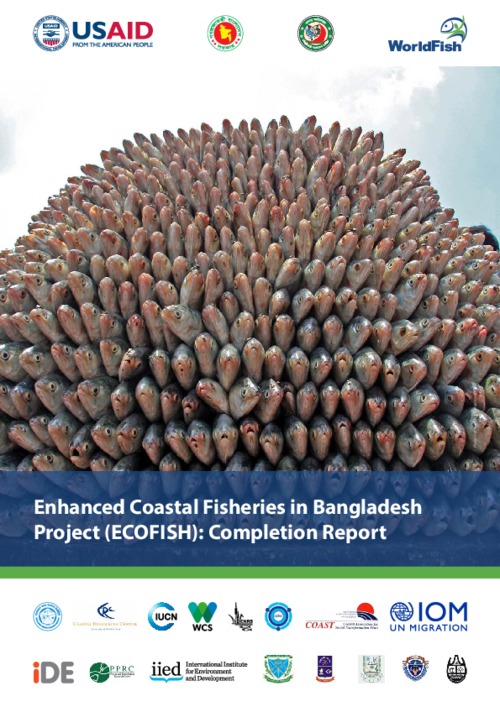Please use this identifier to cite or link to this item:
https://hdl.handle.net/20.500.12348/4543
USAID Enhanced Coastal Fisheries in Bangladesh Project (ECOFISH): Completion Report (2014-2019)
| dc.creator | Abdul, W.M. | en_US |
| dc.creator | Rahman, M.J. | en_US |
| dc.creator | Haque, A.M. | en_US |
| dc.creator | Nahiduzzaman, M. | en_US |
| dc.date.accessioned | 2021-03-09T01:28:17Z | |
| dc.date.available | 2021-03-09T01:28:17Z | |
| dc.identifier.citation | Wahab Abdul, Mohammad Rahman, A. B. M. Haque, Md Nahiduzzaman. (1/2/2020). USAID Enhanced Coastal Fisheries in Bangladesh Project (ECOFISH): Completion Report (2014-2019). | en_US |
| dc.identifier.uri | https://hdl.handle.net/20.500.12348/4543 | |
| dc.description.abstract | Enhanced Coastal Fisheries in Bangladesh (ECOFISH) was a 5-year initiative that ended on December 31, 2019. Funded by the USAID, the project was jointly implemented by WorldFish and Bangladesh’s Department of Fisheries (DOF). ECOFISH supported coastal fishing communities and other stakeholders along the fisheries value chain to improve the resilience of the Meghna River ecosystem and communities reliant on coastal fisheries. ECOFISH’s science (IR1) component aimed at building a comprehensive picture of the hilsa fishery and assisted policymakers in formulating best management solutions. The project estimated the maximum sustainable yield (MSY) of hilsa was about 526,000 metric tons per year in 2016 and 690,000 metric tons per year in 2019 at the level of first capture (25 cm TL). The fishery could improve even further after the implementation of ECOFISH’s recommended allowable mesh size of 6.5 cm for hilsa gillnets and 22-day brood hilsa ban. Using DNA analysis, ECOFISH was able to resolve a long-time dispute by confirming the presence of three hilsa ecotypes in Bangladesh waters. The adaptive co-management (IR2) aimed at synergies between top-down and bottom-up approaches for resource management involving all stakeholders. The co-management activities were implemented in 136 fishing villages and 63 fish landing centers. The project established 575 hilsa conservation groups (HCGs), 148 women-led community savings groups (CSGs), 133 village-level fisheries management committees (FMCs) and 63 hilsa ghat groups (HGGs). These gender inclusive co-management building blocks contributed to forming co-management committees in the six hilsa sanctuaries of the Padma-Meghna river systems. The livelihood resilience (IR3) component designed to improve the livelihoods of coastal fishing households by providing training and inputs for diversified and more resilient AIGAs. The project transferred productive assets and technologies to 19,800 hilsa fishing households. ECOFISH introduced CSGs for women to empower them and increase their participation in hilsa conservation. The project formed 148 CSGs involving 4125 women and saved USD 159,000. The fourth component (IR4) focused on improving policies, streamlining power and supporting sustainable incentive mechanisms for coastal fisheries management. After a systematic consultation with the stakeholders, ECOFISH revised the Hilsa Fisheries Management Action Plan (HFMAP). The project conducted a rigorous study over 3 years, and this resulted in the GOB officially declaring the Nijhum Dwip marine protected area (MPA). ECOFISH created the Hilsa Conservation and Development Fund (HCDF) with seed money of BDT 35 million to support the fishing communities. The most visible success of ECOFISH’s science-based adaptive co-management was the bumper production of hilsa over the last 4 consecutive years of the project (2016–2019). The synergistic impacts of management initiatives increased the annual hilsa catch from 5% to 14%. As a result, the income of fisher households increased 65%, which led to improved livelihood resilience and a 15% reduction in poverty. ECOFISH implemented science-based adaptive co-management in the river sanctuaries of the large river systems of Bangladesh. It is possible that the resulting impacts could continue to expand and provide benefits in the form of increased hilsa and catfish production and biodiversity conservation. | en_US |
| dc.format | en_US | |
| dc.language | en | en_US |
| dc.rights | CC-BY-4.0 | en_US |
| dc.subject | science | en_US |
| dc.subject | policy | en_US |
| dc.title | USAID Enhanced Coastal Fisheries in Bangladesh Project (ECOFISH): Completion Report (2014-2019) | en_US |
| dc.type | Donor Report | en_US |
| cg.contributor.crp | Fish | en_US |
| cg.contributor.funder | United States Agency for International Development | en_US |
| cg.contributor.project | Enhanced Coastal Fisheries in Bangladesh - EcoFish Phase I | en_US |
| cg.coverage.country | Bangladesh | en_US |
| cg.coverage.region | Southern Asia | en_US |
| cg.subject.agrovoc | co-management | en_US |
| cg.subject.agrovoc | resilience | en_US |
| cg.contributor.affiliation | WorldFish | en_US |
| cg.identifier.status | Open access | en_US |
| cg.contribution.worldfishauthor | Abdul, W.M. | en_US |
| cg.contribution.worldfishauthor | Rahman, M.J. | en_US |
| cg.contribution.worldfishauthor | Haque, A.M. | en_US |
| cg.contribution.worldfishauthor | Nahiduzzaman, M. | en_US |
| cg.description.theme | Resilient small-scale fisheries | en_US |
| cg.creator.id | Mohammad Jalilur Rahman: 0000-0003-4090-7339 | en_US |
| cg.creator.id | A.B.M. Mahfuzul Haque: 0000-0002-5334-5630 | en_US |
| cg.creator.id | Md Nahiduzzaman: 0000-0002-5152-992X | en_US |
